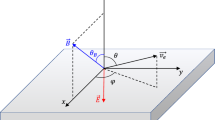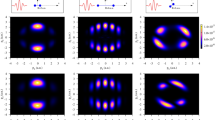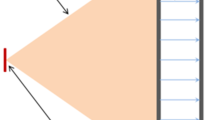Abstract
OLIPHANT and Moon1 recently proposed a theory of electron emission at ion collisions, and succeeded in interpreting the data of Oliphant2. They differentiate two kinds of liberation of electrons: an emission of electrons due only to the kinetic energy of the imparting ions, and an emission which results essentially from the neutralisation of the ions at the surface. On the basis of this theory one would expect to find an appreciable difference in the electron emission of surfaces upon bombarding with neutral atoms and with ions. This difference ought to be distinctly noticeable at low velocities.
This is a preview of subscription content, access via your institution
Access options
Subscribe to this journal
Receive 51 print issues and online access
$199.00 per year
only $3.90 per issue
Buy this article
- Purchase on Springer Link
- Instant access to full article PDF
Prices may be subject to local taxes which are calculated during checkout
Similar content being viewed by others
References
Oliphant and Moon, Proc. Roy. Soc., A, 127, 388; 1930.
Oliphant, Proc. Roy. Soc., A, 127, 373; 1930.
Author information
Authors and Affiliations
Rights and permissions
About this article
Cite this article
KALLMANN, H., ROSTAGNI, A. Liberation of Electrons from Surfaces by Ions and Atoms. Nature 132, 567–568 (1933). https://doi.org/10.1038/132567c0
Issue Date:
DOI: https://doi.org/10.1038/132567c0
Comments
By submitting a comment you agree to abide by our Terms and Community Guidelines. If you find something abusive or that does not comply with our terms or guidelines please flag it as inappropriate.



